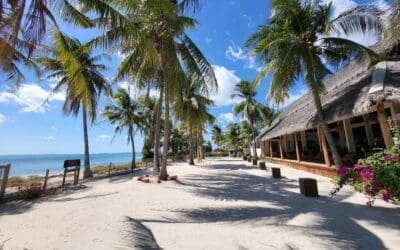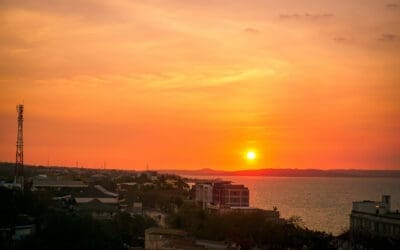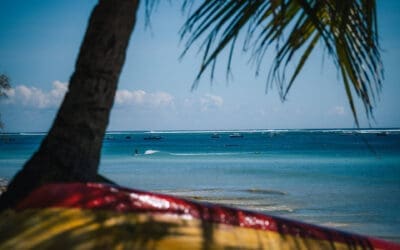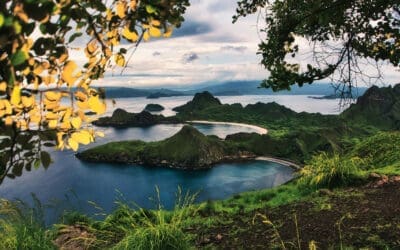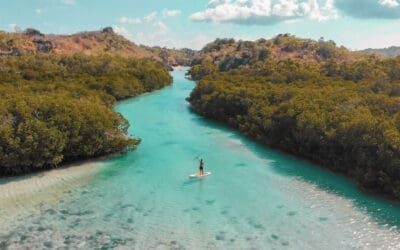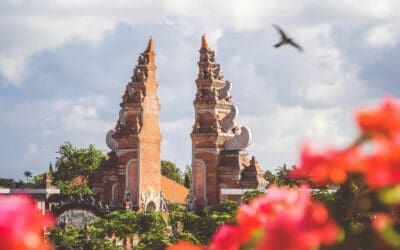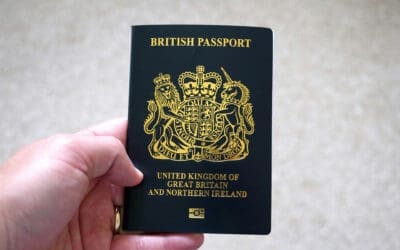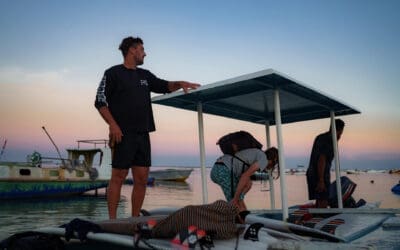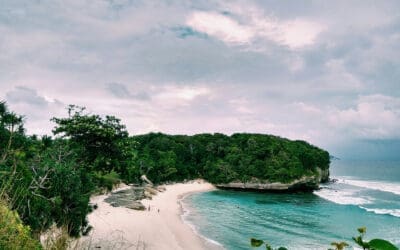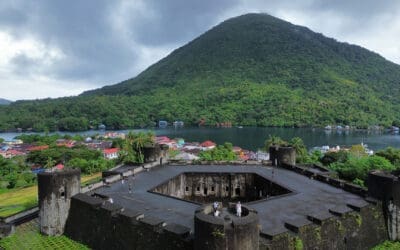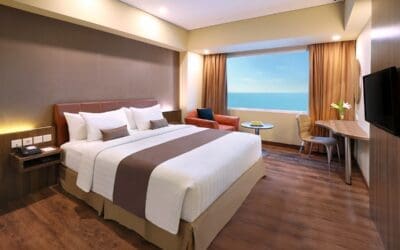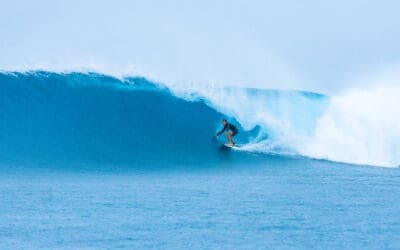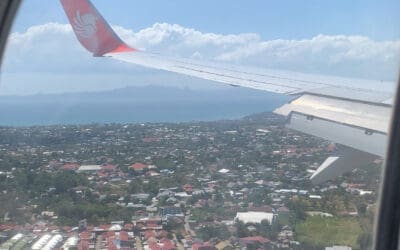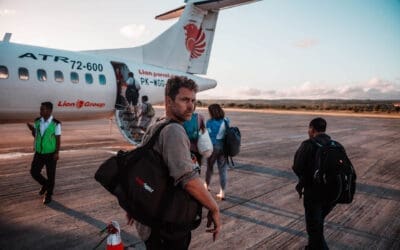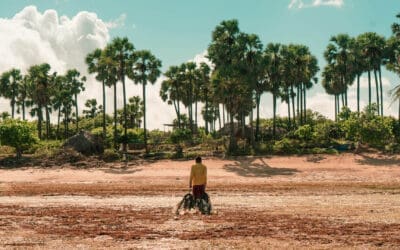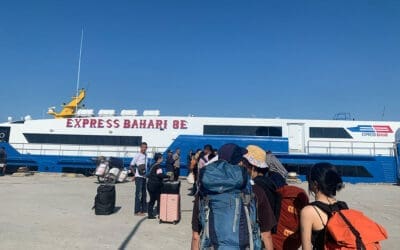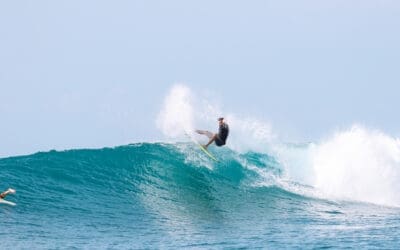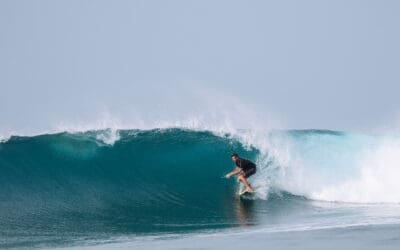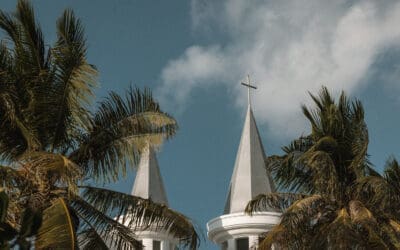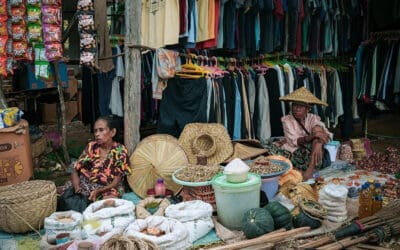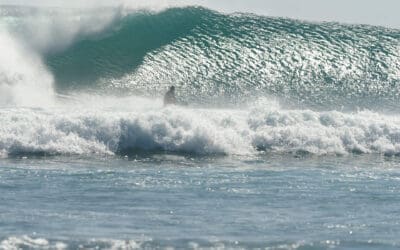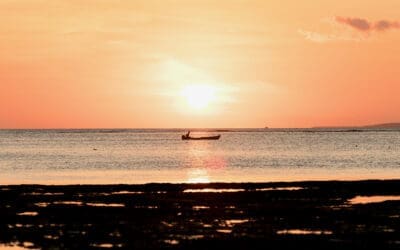Indonesia is famous for its islands, with Bali, Lombok and the Gili Islands regularly topping travel lists for travelers from all across the world.
But there are over 17,000 other islands in Indonesia and these few famous islands are just a tiny part of this sprawling archipelago. So if busy beach clubs, standstill traffic and the flashy Canggu lights are not for you, there are a lot of choices. For those looking to escape the tourist trail, Indonesia’s sprawling archipelago has so much more to offer.
So in this article we are going to give you some reasons to forget about Bali with our favourite Indonesian Islands that are far from the tourist trail, where you will get to experience true natural beauty, crystal clear waters, ancient traditions and a real sense of adventure.
Grab your gear, maybe a pen and paper to make some notes, a sense of adventure, and get out there to explore how much more than Bali, Indonesia has to offer.
Rote Island
A Surfer’s Hidden Paradise
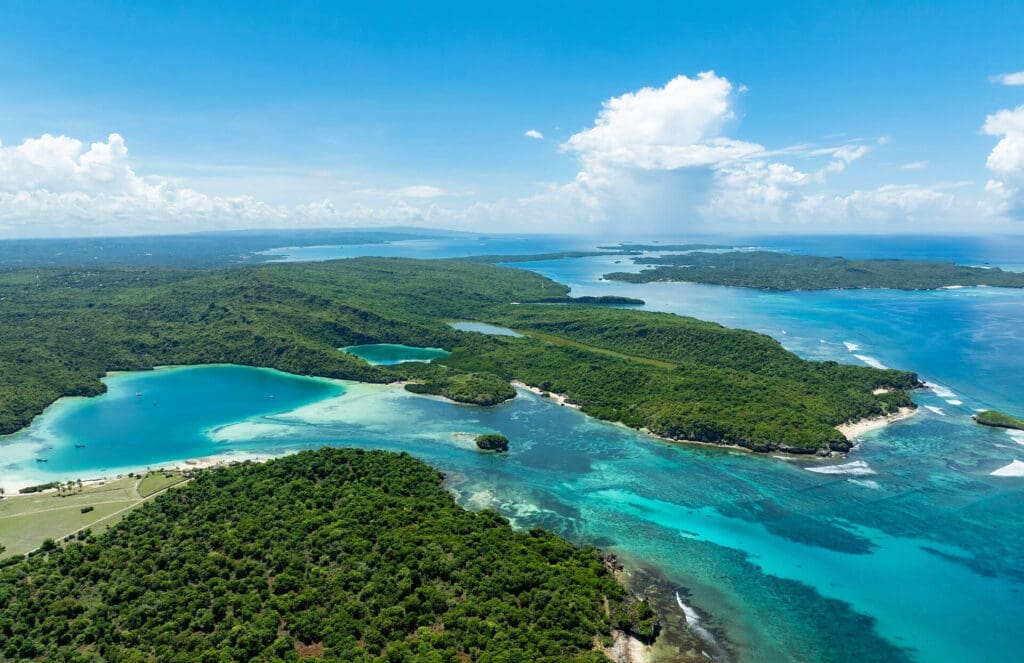
To start our list, of course we head to our home island of Rote. Just off the coast of West Timor in East Nusa Tengarra province you find Rote Island, known for its amazing waves, stunning beaches, vibrant marine life, and rich local culture.
Often overshadowed by its more famous neighbors, Rote boasts unspoiled landscapes, crystal-clear waters, and warm, friendly communities that reflect the true essence of Indonesia..
Rote Island is renowned for its surf breaks, particularly in spots around Nemberala like T-Land, which attract surfers from around the globe. With consistent swells and a laid-back vibe, it’s a paradise for both novice and experienced surfers.
Away from the surf, the island offers a range of activities for nature lovers, including snorkeling, diving, and exploring hidden lagoons. Rich in cultural heritage, Rote is also the birthplace of the traditional woven fabric known as Tenun Ikat, and visitors can experience the local customs and traditions firsthand.
Must-Do Activities in Rote Island
- Surf
Rote Island is a surfer’s paradise, especially round Nemberala in the SW corner. Known for its consistent waves and crystal clear water, whether you’re a beginner or a pro, there’s a wave here for everyone.
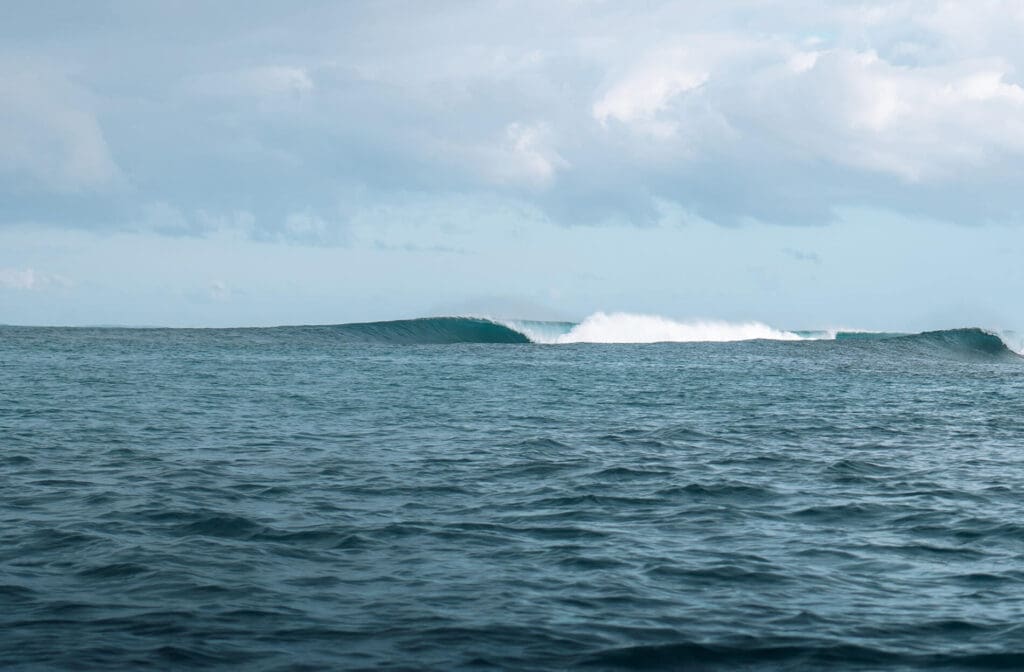
- Snorkel in Crystal-Clear Waters
The same shallow reefs that create the amazing waves, also crete amazing lagoons, where you can discover the vibrant life under the surface. The colorful coral reefs and abundant marine life, including tropical fish and sea turtles, make for an unforgettable experience.
- Visit the Traditional Villages and Markets
Immerse yourself in Rote’s rich culture by visiting local villages and weekly markets. Engage with the friendly locals, learn about their traditional weaving techniques, and experience their way of life.
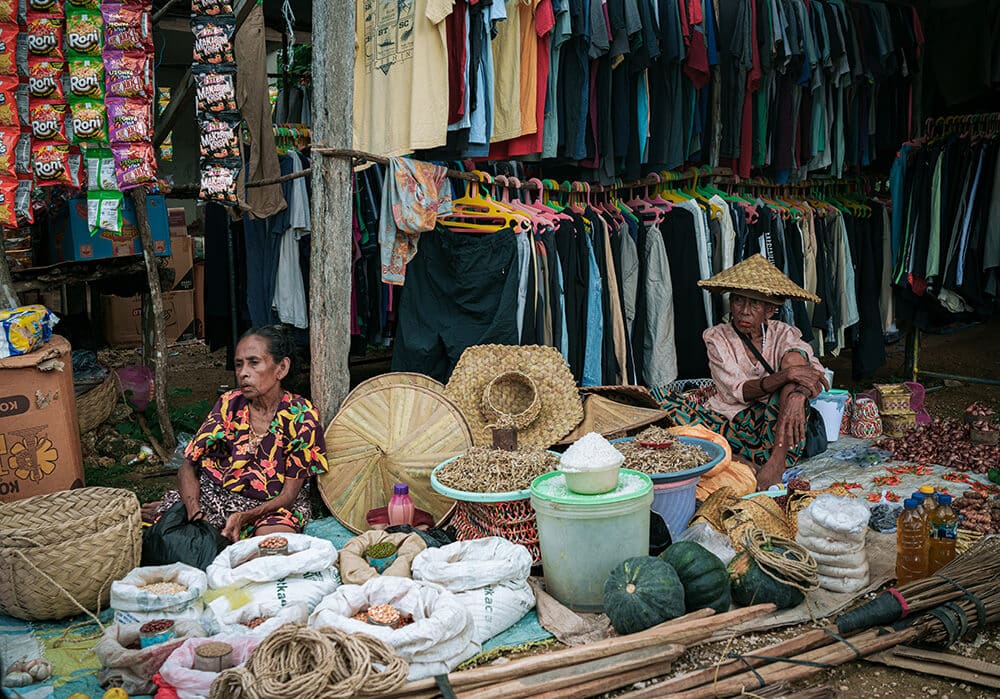
- Attend Local Festivals
Participate in Rote’s vibrant festivals and ceremonies, which showcase the island’s unique traditions. These events offer a glimpse into the local culture and an opportunity to connect with the community.
- Discover Rote’s Hidden Beaches
Venture off the beaten path to find Rote’s secluded beaches, such as Pantai Dendara and Pantai Doku. These hidden gems offer tranquility and stunning natural beauty, perfect for a peaceful getaway. You will find empty beaches seemingly everywhere.
- Diving Adventures
For diving enthusiasts, Rote Island offers diverse dive sites that reveal the beauty of the underwater ecosystem. Experience the vibrant marine life and stunning coral formations that thrive in these waters.
- Explore the Island by Bike or Scooter
Rent a bike or scooter to explore the island’s scenic routes and discover hidden treasures at your own pace. Enjoy the breathtaking views of the coastline and lush landscapes as you navigate through charming villages.
- Learn Traditional Weaving
Try your hand at the art of Tenun weaving. This intricate process involves creating beautiful patterns and textiles that reflect Rote’s cultural heritage, making for a unique souvenir to take home.
Why Go to Rote Island
Rote Island is an ideal destination for travelers seeking a blend of adventure, relaxation, and cultural immersion. Its stunning natural beauty, coupled with a welcoming community, creates a unique atmosphere that invites exploration and discovery. With its excellent surf breaks, vibrant marine life, and rich cultural traditions, Rote is a perfect getaway for surf enthusiasts, nature lovers, and those looking to experience Indonesia away from the crowds.
The island’s off-the-grid charm means you can enjoy a laid-back lifestyle and connect with the local community, making your visit truly special. Whether you’re catching waves, snorkeling in crystal-clear waters, or engaging with local traditions, Rote Island promises a memorable experience that showcases the best of Indonesia’s hidden treasures.
5 Reasons to Visit Rote Island, Indonesia
Rote Island Surf Guide
Sumba
Rugged Beauty and Rich Cultural Heritage
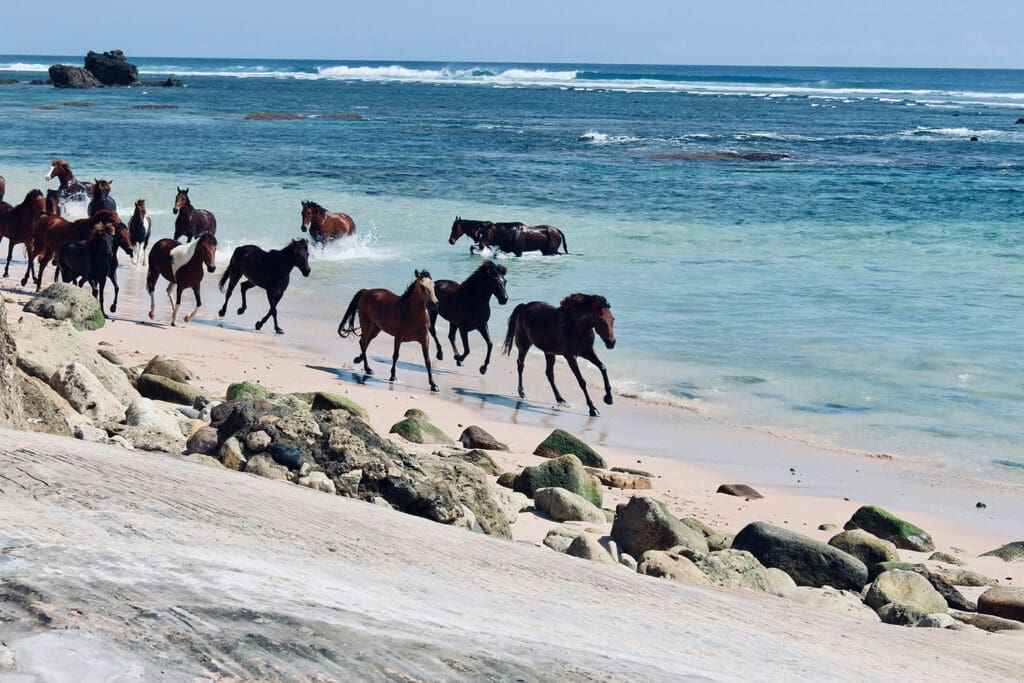
Between the islands of Komodo and Sumbawa, you find Sumba, a stunning island in East Nusa Tenggara Province that showcases the diversity of Indonesia. Known for its rolling savannahs and limestone hills, Sumba is a land where traditional hilltop villages coexist with vibrant cultural practices.
Here, you’ll find thatched clan houses surrounded by megalithic tombs, where locals honor their ancestors through the ancient Marapu belief system.
Beyond its landscapes, Sumba is famous for the exquisite Tenun Ikat handwoven fabric and the strong Sumba Ponies, also known as Sandalwood Horses.
You may have heard of Sumba due to the luxury of Nihiwatu Resort, often recognized among the world’s best hotels. However, Sumba offers much more than high-end resorts; it’s an emerging destination for adventure seekers, culture enthusiasts, and those looking to experience Indonesia’s rich indigenous heritage in a more authentic setting.
Top 10 Must-Do Activities in Sumba
- Surf
Sumba is well known within the surf community, especially between May and October when the Sumba swell season is in session. The island’s uncrowded beaches and pumping waves are more than worth the journey.
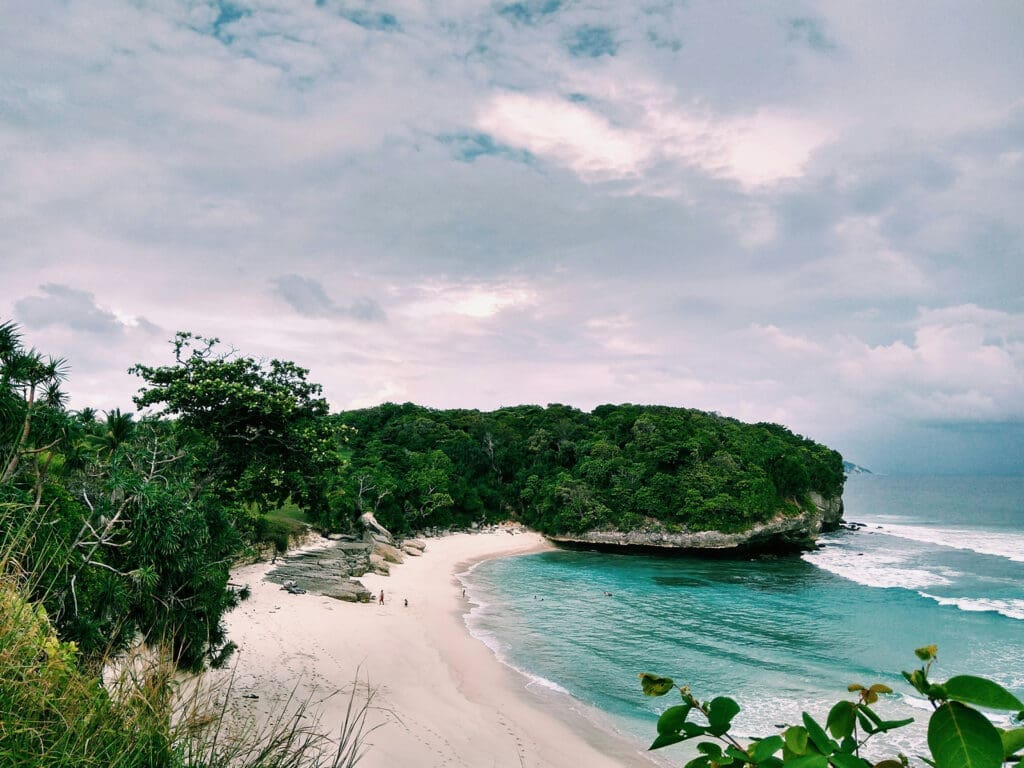
- Experience the Pasola Festival
Don’t miss the exhilarating Pasola jousting festival held between February and March, where bareback riders clash in a vibrant display of skill and tradition. This exciting event is a celebration of fertility and community spirit, attracting visitors from all over.
- Explore Traditional Villages
Visit the picturesque villages of Prailiu and Kwangu, renowned for their exquisite ikat weaving. Engage with local artisans and witness the intricate process of creating these beautiful fabrics that reflect Sumba’s cultural motifs.
- Relax at Luxury Resorts
Indulge in the serene atmosphere of Sumba’s luxury resorts, like Nihi, Sanubari and Sumba Nautil Resort. These accommodations offer stunning ocean views, peaceful retreats, and opportunities for adventure, such as dolphin watching and horse back riding.
- Visit the Megalithic Tombs
Explore the ancient megalithic tombs scattered throughout the island, where you can delve into the rich history and customs of the Sumbanese people. These sites are not only historically significant but also set against breathtaking backdrops.
- Discover Hidden Waterfalls
Venture inland to uncover Sumba’s hidden waterfalls, such as Tanjung Saleh Waterfall. A hike through the lush jungle leads to these picturesque falls, providing a refreshing escape into nature.

- Immerse in Local Culture
Engage with the friendly locals to learn about their customs, culinary traditions, and daily lives. Participate in cultural exchanges that allow you to experience Sumba’s authentic way of life.
- Explore the Rugged Terrain
Take advantage of Sumba’s stunning landscapes by hiking through its rolling hills and savannahs. The island’s diverse terrain offers ample opportunities for adventure, with picturesque views at every turn.
- Witness Unique Rituals
Attend local ceremonies and festivals to gain insight into Sumba’s rich cultural practices. These events showcase the island’s vibrant traditions and offer a chance to connect with the community on a deeper level.
Why Go to Sumba
Sumba is a captivating destination for travelers seeking authenticity, adventure, and a connection to Indonesia’s diverse culture. With its stunning landscapes and rich traditions, the island promises a unique experience away from the crowded tourist paths. While the luxury resorts offer a taste of indulgence, it’s Sumba’s natural beauty and vibrant culture that leave a lasting impression.
By visiting Sumba, you’re supporting the local community and participating in the sustainable tourism movement that prioritizes cultural exchange and environmental stewardship. Experience the warmth of Sumbanese hospitality, explore its rugged terrain, and discover a destination that’s rich in history and beauty.
Wakatobi Islands
A Diver’s Dream Destination
In the southeastern corner of Sulawesi, the Wakatobi Islands are a hidden paradise for those seeking unspoiled natural beauty and tranquility.
This remote archipelago, comprising Wangi-Wangi, Kaledupa, Tomia, and Binongko, offers a unique escape from the bustling tourist hotspots of Indonesia. Named after the first letters of these four islands, Wakatobi National Park spans an impressive 1.4 million hectares, showcasing some of the most biodiverse marine environments on the planet.
Known for its stunning diving and snorkeling sites, Wakatobi has over 750 species of coral and 942 species of fish, making it a top destination for underwater enthusiasts.
Regular flights connect Wakatobi to Makassar, allowing easy access to its pristine beaches, jet-blue waters, and vibrant local culture. Here, visitors can immerse themselves in an enriching experience filled with breathtaking surroundings, unique culinary delights, and cultural interactions.
Things to Do in Wakatobi
- Snorkeling and Scuba Diving
Discover the underwater wonders of Wakatobi with its world-renowned dive sites. Dive among colorful coral reefs and encounter diverse marine life, including turtles and dolphins.
- Explore the Bajo Tribe
Visit the village of Mola on Wangi-Wangi Island to meet the Bajo people, descendants of sea nomads known for their incredible diving skills and unique way of life.
- Relax on Hoga Island
Unwind on the pristine shores of Hoga Island, where you can snorkel, dive, or simply enjoy the tranquility of nature away from technology.
- Hike to Kahyangan Summit
Take a short hike to the Kahyangan Summit on Tomia Island for panoramic views of the surrounding islands and breathtaking sunsets.
- Discover Lakasa Cave
Venture into Lakasa Cave near Bau-Bau to explore its stunning stalactites, stalagmites, and cool, crystal-clear lake believed to possess healing properties.
- Visit Anano Beach
Known as the beach with a thousand turtles, Anano Beach is the perfect spot for turtle watching, especially during the full moon when they come ashore to lay eggs.
- Experience Sombano Lake
Discover the enchanting Sombano Lake, surrounded by a lush mangrove forest and filled with vibrant red crustaceans, but beware of the mythical black crocodile said to dwell within.
- Savor Traditional Cuisine
Don’t miss out on local delicacies such as Kusami (grated cassava) and Parende (fish soup), which showcase the unique flavors of Wakatobi.
- Shop for Handicrafts
Bring home beautifully crafted souvenirs, including the intricate Homoru sarongs and coconut shell ornaments made by local artisans.
- Watch the Lariangi Dance
If you’re lucky, you might catch a performance of the Lariangi Dance, a traditional dance from Kaledupa that showcases the island’s rich cultural heritage.
Why Visit Wakatobi?
Wakatobi is a true gem for those looking to escape the crowds and immerse themselves in nature and culture. Its stunning underwater landscapes are a diver’s dream, while the unique traditions of the Bajo people offer a glimpse into a way of life intimately connected to the sea. With its breathtaking views, pristine beaches, and rich marine biodiversity, Wakatobi provides an unforgettable experience that will leave you rejuvenated and inspired. Whether you seek adventure, relaxation, or cultural enrichment, Wakatobi promises an island getaway like no other.
Kei Islands
White Sand Beaches and Crystal Clear Waters
The Kei Islands, a hidden paradise in the southeastern Maluku province of Indonesia, are a captivating archipelago known for their stunning beaches, rich marine biodiversity, and vibrant cultural heritage.
Comprising several islands, including Kai Besar, Kai Kecil, and the charming Tanimbar Kai, the Kei Islands are known for their natural beauty and fascinating local legends. With their powdery white sands and crystal-clear waters, these islands promise a tropical getaway like no other.
Top Things to Do in the Kei Islands
- Explore Pasir Panjang Beach
Renowned for its pristine white sands, Pasir Panjang is a must-visit for beach lovers. Spend the day sunbathing, swimming, or simply enjoying the breathtaking scenery. The beach’s tranquility makes it a perfect spot for relaxation.
- Snorkeling and Diving Adventures
The Kei Islands are part of the Coral Triangle, famous for its rich marine biodiversity. Dive or snorkel in the vibrant waters around Duroa Island and Adranan Island, where you can encounter colorful coral reefs and an array of tropical fish.
- Island Hopping Tours
Discover the beauty of the Kei Islands by hopping from one island to another. Take a local boat to explore hidden lagoons and secluded beaches, such as the breathtaking Bair Island, often referred to as “Little Raja Ampat.”
- Visit the Ghost Cave (Goa Hawang)
Embark on a hike to the Ghost Cave, where local legends intertwine with natural beauty. The cave features a stunning aquamarine swimming hole fed by a natural spring, along with fascinating stalactite formations. Be sure to respect the local folklore as you explore.
- Cultural Encounters
Engage with the local communities and immerse yourself in the rich cultural heritage of the Kei Islands. Learn about the intriguing stories of Raja Song Sing and the historical significance of the islands from the friendly villagers.
Why Visit the Kei Islands?
The Kei Islands offer an enchanting blend of natural beauty and cultural richness that sets them apart from other Indonesian destinations. With their relatively untouched landscapes and fewer tourists, the islands provide a peaceful atmosphere for travelers seeking solace in nature. The vibrant marine life, stunning beaches, and engaging local traditions create a unique travel experience that allows visitors to connect with both the environment and the local culture. Whether you’re an adventure seeker or someone looking to unwind, the Kei Islands promise a memorable escape filled with wonder and tranquility.
Morotai
WWII History and Stunning Beaches
Tucked between the Pacific Ocean, Celebes Sea, and Halmahera Sea, Morotai is the northernmost gem of the Moluccas and part of the Coral Triangle, making it a hotspot for marine biodiversity.
Morotai gained historical significance during WWII, chosen by General Douglas MacArthur as his strategic base for the Pacific campaign. You can still visit Zumzum Island, where a statue honors MacArthur, marking the spot he frequented during his time on the island.
Adding to the island’s intriguing WWII history is the story of Japanese soldier Teruo Nakamura, who, unaware that the war had ended, lived hidden in the jungle until he was discovered in the early 1970s.
While Morotai’s history is compelling, the island’s true allure lies in its natural beauty. Covered in dense jungle and interwoven with rivers, Morotai’s landscapes offer a haven for nature lovers. White-sand beaches, turquoise waters, and untouched islands dot its coastline, perfect for secluded escapes.
Unlike its volcanic neighbors, Morotai’s beaches remain bright white, offering endless stretches of sand that feel worlds away from the usual tourist spots.
Top 10 Must-Do Activities in Morotai
- Explore Zumzum Island and the General MacArthur Statue
Visit Zumzum Island to see the statue commemorating General Douglas MacArthur, a tribute to the island’s historical role in WWII. This small island offers a unique piece of history and scenic views over the surrounding waters.
- Dive or Snorkel in the Coral Triangle
Morotai’s location in the Coral Triangle makes it a premier spot for divers and snorkelers. Dive into the clear waters to discover colorful coral reefs and a rich array of marine life, including clownfish, turtles, and vibrant soft corals.
- Island Hopping around Morotai
With numerous small islands nearby, Morotai is ideal for island hopping. Visit places like Dodola Island, where you can walk across a sandy pathway between two islands during low tide, or explore uninhabited islands for a private beach experience.
- Discover WWII Relics and the Morotai Museum
Delve into the island’s WWII past by visiting a local museum showcasing relics, artifacts, and personal items left by soldiers. The displays offer a fascinating glimpse into the war’s impact on this remote part of the world.
- Relax on Morotai’s Pristine Beaches
Morotai is home to some of Indonesia’s most untouched beaches. Spend a day relaxing on white-sand shores like Ngele-ngele Beach or Bere Bere Beach, where you’ll find calm turquoise waters and solitude.
- Visit the Hidden Waterfalls of Morotai
Head inland to discover Morotai’s hidden waterfalls, like the refreshing Tanjung Saleh Waterfall. Hike through the jungle for a rewarding dip in these scenic falls, surrounded by lush greenery and the sounds of nature.
- Surf the Waves on the Island’s Coastline
While Morotai isn’t widely known as a surfing destination, parts of the coastline offer surfable waves, perfect for those looking to catch a few rides in a less crowded setting.
- Hike through Morotai’s Dense Jungle and Rivers
With much of the island covered in dense forest, Morotai offers excellent opportunities for jungle trekking. Explore trails that lead through untouched rainforest and river crossings, allowing you to experience the island’s raw, natural beauty.
- Visit the Japanese Soldier’s Hideout Site
Learn about the incredible story of Teruo Nakamura, a Japanese soldier who hid in Morotai’s jungle until the 1970s, unaware that WWII had ended. Visiting the area brings a fascinating and surreal part of history to life.
- Experience Local Culture and Traditions
Slow down and enjoy Morotai’s easygoing lifestyle by engaging with the friendly locals. Take part in cultural exchanges, sample local dishes, and join in the island’s daily rhythms, from agriculture to fishing.
Why Go to Morotai
Recently designated one of Indonesia’s “10 New Bali” destinations, Morotai is in the early stages of developing tourism infrastructure, particularly in the south. This means visitors can enjoy an off-the-beaten-path experience while infrastructure improvements steadily enhance access to its beaches and natural attractions.
For surfers, Morotai offers uncrowded waves along parts of its coast, a hidden gem for those looking to avoid busier surf spots. With quality waves and few surfers, it’s a unique and rewarding experience for adventurous wave seekers.
Morotai’s residents live at a relaxed pace, and their genuine warmth makes it easy for travelers to connect with local life. Engage in everyday activities, enjoy traditional meals, and local get togethers (Just make sure to avoid the betel nuts)—all adding to the charm of an off-the-beaten-path journey.
Alor
A Hidden Gem of Culture and Biodiversity
In the heart of the Alor Archipelago, Alor is a remote paradise that offers a unique blend of stunning natural beauty and rich cultural heritage. Just an hour’s flight from Kupang, the capital of West Timor, Alor consists of the main islands of Alor and Pantar, along with several smaller islands, all surrounded by pristine blue waters teeming with marine life. The region is renowned for its biodiversity, part of the Coral Triangle, making it a top destination for diving and snorkeling enthusiasts.
Alor’s rugged landscape features steep mountains, lush rainforests, and dry savannahs, while the coastline boasts white-sand beaches and vibrant coral reefs. Its cultural richness is equally impressive, with over eight distinct ethnic groups and more than 50 dialects spoken across the islands. Visitors can immerse themselves in the local way of life, which is characterized by traditional practices, vibrant festivals, and warm hospitality.
Top 10 Must-Do Activities in Alor
- Dive and Snorkel in the Coral Triangle
Alor is a diver’s paradise, boasting some of the best dive sites in the world. Explore vibrant coral reefs, underwater caves, and an abundance of marine life, including colorful fish, turtles, and even manta rays.
- Visit Traditional Villages
Take a day trip to the traditional villages of Takpala and Mombang to experience the rich cultural heritage of the Alorese people. Engage with locals, observe traditional weaving, and participate in age-old rituals.
- Explore the Museums of Kalabahi
Visit the 1000 Moko Museum in Kalabahi to learn about the region’s history and cultural artifacts, including ancient drums and ceremonial items that reflect the island’s diverse traditions.
- Trek in the Alor Mountains
Embark on a multi-day trek through the breathtaking Alor Mountains. Experience the beauty of rural landscapes, stay with local families, and gain insight into their traditional lifestyles.
- Relax on the Beaches of Alor
Unwind on Alor’s stunning beaches, such as Alor Besar and Alor Kecil, where crystal-clear waters and powdery sands create the perfect setting for swimming and sunbathing.
- Experience Local Festivals and Dances
Don’t miss the opportunity to witness the lively “lego-lego” dance, a traditional performance that showcases the community spirit of the Alorese people, often celebrated during festivals and gatherings.
- Visit the Active Volcano of Sirung
For the adventurous, a trek to the Sirung Volcano on Pantar Island offers breathtaking views and the chance to explore the unique geological features of the area.
- Enjoy Water Sports
In addition to diving, Alor offers excellent opportunities for snorkeling, swimming, and kayaking, allowing visitors to explore the vibrant marine environments up close.
- Taste Local Cuisine
Savor the flavors of Alor by trying local dishes made from fresh seafood, tropical fruits, and traditional ingredients. Don’t miss the chance to sample “siri-pinang,” a local delicacy made from betel nut.
- Take a Boat Tour of Nearby Islands
Rent a traditional fishing boat to hop between the nearby islands, such as Kepa, Ternate, and Pura, each offering unique landscapes and secluded beaches.
Why Go to Alor
Alor is a hidden gem that is still relatively untouched by mass tourism, making it an ideal destination for those seeking an authentic experience. The island’s remoteness has preserved its natural beauty and cultural richness, allowing visitors to escape the hustle and bustle of modern life. The friendly locals and their vibrant traditions create a warm atmosphere that welcomes travelers with open arms.
With its stunning marine biodiversity, breathtaking landscapes, and rich cultural heritage, Alor promises an unforgettable adventure for those willing to explore its enchanting shores. Whether you’re diving in the coral reefs, trekking through the mountains, or simply relaxing on a pristine beach, Alor offers a unique blend of experiences that will leave you wanting more.
Tips for Traveling to Undiscovered Indonesian Islands
- Plan Your Journey Well: Many of these islands are remote, with limited transport options, so be sure to plan your travel carefully.
- Embrace Local Culture: Indonesia’s lesser-known islands are steeped in tradition, so learning a bit about local customs and norms will go a long way.
- Sustainable Tourism: As these islands become more popular, it’s essential to practice sustainable tourism. Support local businesses, minimize waste, and respect the environment.
Check out our Essential Travel Tips for Exploring Remote Indonesia for more.
Final Thoughts
Indonesia’s lesser-known islands provide an escape into pristine natural beauty, unique cultures, and memorable adventures. From surfing in Rote to diving in Wakatobi, these islands are the perfect destinations for travelers seeking something different from the usual tourist spots. By visiting these hidden gems, you’ll not only have a unique travel experience but also support the communities preserving these beautiful destinations for future generations.

